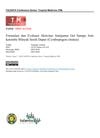signaling protein that, when suppressed, may grow hair by reducing inflammation and stem cell loss
natural substance from Neem tree with medicinal and pesticidal properties
Heavy duty finasteride that comes with higher risks, but scalp injections seem safe and are gaining popularity


![Synthesis and In Vitro Study of 17β-[N-Ureylene-N,N′-Disubstituted]-4-Methyl-4-Aza-5α-Androstan-3-Ones as Selective Inhibitors of Type I 5α-Reductase](/images/research/d19df8a7-8de6-4430-8a0d-4ffa1f502985/small/15608.jpg)

